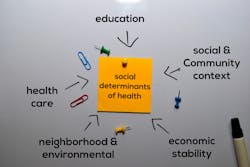Two researchers from Kaiser Permanente Washington Health Research Institute will seek to take a national network that supports Kaiser Permanente initiatives aimed at addressing members’ social needs to the next level.
Cara Lewis, Ph.D., Kaiser Permanente Washington Health Research Institute associate investigator, and Katie Coleman, M.S.P.H., director of the KPWHRI MacColl Center for Health Care Innovation and Kaiser Permanente Washington’s Learning Health System Program, are the new co-directors of SONNET, the Social Needs Network for Evaluation and Translation.
Supported by Kaiser Permanente’s National Community Health Program, SONNET helps Kaiser Permanente researchers, leaders, and medical professionals design, evaluate, and learn from initiatives that address essential needs such as social connection, food, housing, and transportation.
Kaiser Permanente sees SONNET as a learning community that ensures that lessons from one program are used to optimize its impact and shared to inform development of others. It supports efforts such as Thrive Local, a national Kaiser Permanente initiative to connect members with community services. (Recent data indicates that in certain regions, up to 29 percent of Kaiser Permanente's members that have the greatest medical challenges are dealing with food insecurity, and as many as 23 percent have concerns about housing stability – critical issues that are among the types of challenges that Thrive Local is seeking to address.
SONNET has served these initiatives, with more than $10 million in funding so far.
“This focus on social needs is part of the Kaiser Permanente commitment to health equity, particularly identifying and understanding root causes of health disparities,” says Rita Mangione-Smith, M.D., M.P.H., KPWHRI executive director and Kaiser Permanente Washington vice president for research and health care innovation, in a statement. “Katie and Cara have demonstrated that commitment through their research and leadership. They’re an excellent choice to lead SONNET and advance its vital work.”
Lewis and Coleman bring complementary expertise to the SONNET directorship. In addition to her role at the MacColl Center, Coleman directs the Learning Health System Program, overseeing collaborations between KPWHRI and the delivery system, including supporting the design and leading the evaluation of two new primary care clinics. From years of work designing, implementing and evaluating large-scale health system transformations as a MacColl researcher, she brings skills in developing and maintaining robust connections with community partners and large and small health care organizations, including federally qualified health centers.
Lewis brings expertise in implementation research with a focus on measurement, rapid evidence reviews, pragmatic methods, and survey research. She has experience guiding large networks and programs, for example as former president of the international Society for Implementation Research Collaboration (SIRC). She has served as a SONNET steering committee member since its inception. With Bianca DiJulio, KPWRHI Survey Research Program manager, Lewis led a national survey of more than 10,000 Kaiser Permanente members to measure prevalence of social risk factors. Their findings will include the effect of COVID-19 on these risk factors.
Coleman and Lewis begin their term as co-directors in early 2021, taking over from John Steiner, M.D., M.P.H., who helped found SONNET and has been director since its launch in 2017.


